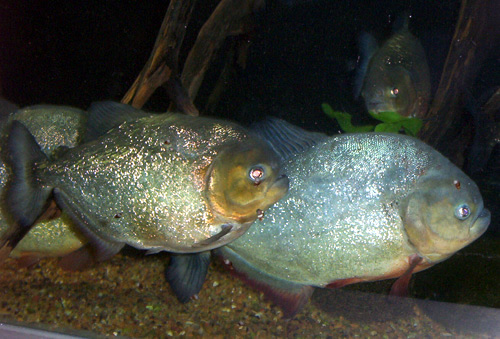
I miss that. Since I am right now in Europe, I haven't eaten piranhas for a while. They really taste good. Salmon? No comparison. I'd rather eat a piranha time after time. I remember once I helped a little bit at an exhibition organized by Latin Americans at the University of Glasgow. The exhibition, set up next to the university's library, contained objects Latin American students and professors had put together. All in all, it made for an interesting show: there were traditional clothes from the different Latin American countries, music instruments, pictures, ceramics. I showed the place to a group of school children. I remember when I came up to a stuffed piranha one of us had brought. The children looked at it in amazement, specially at its teeth. I told them piranhas live in the Amazon and the Orinoco basin, I told them there were many species of piranhas, I told them about piranhas' habits and at the end I said with feigned off-handedness: "oh, and they are delicious". The children found that specially cool.
So, yes, we eat piranhas. You can buy them even in the supermarket in big cities. They can be dangerous to humans under certain conditions, but it is generally we who are more dangerous to them. Piranhas have been food for the native South Americans for many thousands of years. They are one of the many wonderful creatures you can find in the Orinoco basin.
I haven't heard for months about the environmental conditions we have in the Orinoco basin now. I doubt they have improved, though. The latest I read about developments there last year was that the oil industry was polluting more and more. I also read about the transformation of Indian villages and the effect in the environment in the Orinoco Delta. I heard about problems with the pink dolphin. I have heard about the continuous problem of pollution generated by cities such as Ciudad Guayana. I know very well about the destruction the so-called "eco-turismo" is doing in Venezuela in general.
I want to take a look at the Orinoco in the following months, first from afar and them back there. If you happen to have some first-account report about the Orinoco, its environment, the effects on fish and other animals there, on its flora, send me an email, please.
It would be great if our grandchildren can know what a piranha tastes like, if they can see a pink dolphin swiming around there or the now critically-endangered Orinoco crocodile. Actually, as much as I miss the taste of a piranha, I can give it up for a big while in order to make its existance sustainable.

It’s so nice site. We love to see more on this site. Keep on updating… MonkAreYou Bali *fgh8n
ReplyDeleteSince you are on the subject of the Orinoco what do you think of the recent deal Chavez and Castro made about bringing in Cuban farmers to the Orinoco? Cuba and Venezuela will split 50/50.
ReplyDeleteWhy can not Chavez find enough farmers in Venezuela to do the farming?
For reference to others (in Spanish)
ReplyDeletehttp://economia.noticias24.com/noticia/1846/cuba-enviara-campesinos-para-cultivar-en-la-cuenca-del-orinoco/
Anonymous,
I think it is a very bad policy.
There are lots of Venezuelans who could do that and there will be many more in a couple of months.
Chavez has taken many stupid policies similar to that. One of them was to let a Belorussian company build normal social flats Venezuelan companies could have built.
I am not sure about what exact areas they want to cultivate, I
wonder if that project is environmentally sound anyway, whether with Cubans or Venezuelans.